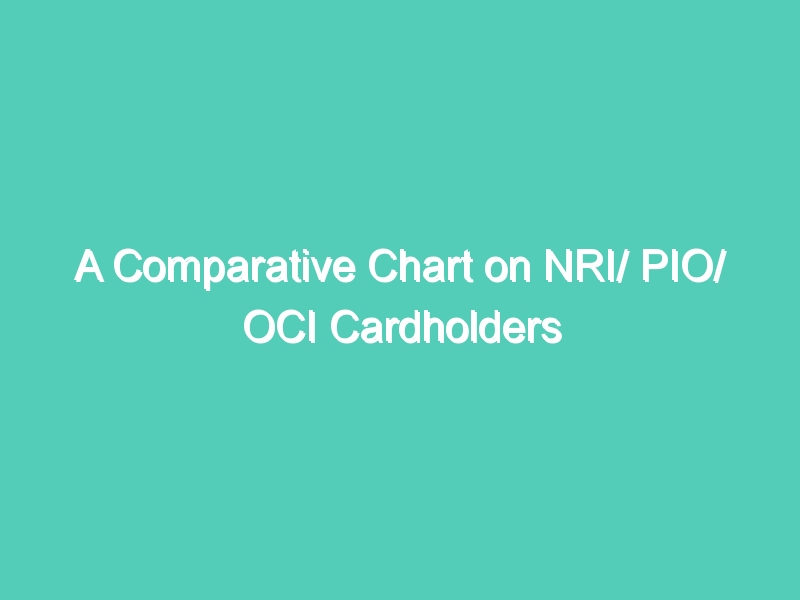How are Non-Resident Indians (NRIs), People of Indian Origin (PIOs) and Overseas Citizenship of India (OCI) cardholders different?
| NRI | PIO | PIO Cardholder | OCI Cardholder | |
| Who? | An Indian citizen who is ordinarily residing outside India and holds an Indian passport. | A person or whose any of ancestors was an Indian national and who is presently holding another country’s citizenship/ nationality i.e. he/she is holding foreign passport. | A person registered as PIO Card Holder under MHA’s scheme vide Notification No. 26011/4/98-F.I dated 19.08.2002. | A person registered as Overseas Citizen of India (OCI) under section 7A of the Citizenship Act, 1955. |
| Who is eligible? | – | – | Any person who at any time held an Indian Passport; or he or either of his parents or grand parents was born in or was permanently resident in India as defined in Government of India Act, 1935 and other territories that became part of India thereafter provided neither was at any time a citizen of Afghanistan, Bhutan, China, Nepal, Pakistan and Sri Lanka; or who is a spouse of a citizen of India or a person of Indian origin as mentioned above. | A foreign national, who was eligible to become citizen of India on 26.01.1950 or was a citizen of India on or at anytime after 26.01.1950 or belonged to a territory that became part of India after 15.08.1947 and his/her children and grand children, provided his/her country of citizenship allows dual citizenship in some form or other under the local laws, is eligible for registration as Overseas Citizen of India (OCI). Minor children of such person are also eligible for OCI. However, if the applicant had ever been a citizen of Pakistan or Bangladesh, he/she will not be eligible for OCI. |
| Which nationals are eligible? | – | – | PIOs of all countries except Afghanistan, Bangladesh, Bhutan, China, Nepal, Pakistan and Sri Lanka | PIOs of all countries except Pakistan and Bangladesh. |
| What benefits one is entitled to? | All benefits as available to Indian citizen subject to notifications issued by the Government from time to time | No specific benefits. | (i)Shall not require a separate visa to visit India. (ii) Will be exempt from the requirements of registration if his/her stay on any single visit in India does not exceed 180 days. (iii) In the event of continuous stay in India exceeding 180 days, he/she shall have to get himself/herself registered within 30 days of the expiry of 180 days with the concerned FRRO/FRO. (iv) Parity with NRIs in respect of all facilities available to the later in the economic, financial and educational fields except in maters relating to the acquisition of agricultural/ plantation properties. No parity shall be allowed in the sphere of political rights. | (i) A multiple entry multi-purpose life long visa for visiting India. (ii)Exemption from registration with local police authority for any length of stay in India. (iii) Parity with Non resident Indians (NRIs) in respect of economic, financial and educational fields except in relation to acquisition of agricultural or plantation properties. No parity shall be allowed in the sphere of political rights. Any other benefits to OCIs will be notified by the Ministry of Overseas Indian Affairs (MOIA) under Section 7B(1) of the Citizenship Act, 1955. |
| Does he/she require visa for visiting India? | No. | Yes and of specific type depending on his/her purpose of visit. | Can visit India without visa for 15 years from the date of issue of PIO card. | No. |
| Is he required to register with local police authorities in India? | No. | Yes. | Yes, one time when the stay in India exceeds 180 days for the first time. | No. |
| What activities can be undertaken in India? | All activities that Indian Nationals can. | Activity as specified in the visa. | All activities except mountaineering, missionary and research work and existing PAP/RAP which require specific permit. | All activities except mountaineering, missionary and research work and existing PAP/RAP which require specific permit. |
| How can one acquire Indian citizenship? | He/She is an Indian citizen. | As per section 5(1) (a) & 5(1) (c) of the Citizenship Act, he/she has to reside in India for minimum 7 years before making application for granting Indian citizenship | As per section 5(1) (a) & 5(1) (c) of the Citizenship Act, he/she has to reside in India for minimum 7 years before making application for granting Indian citizenship | Registered OCI may be granted Indian citizenship after 5 years from date of registration provided he/she stays for one year in India before making application. |
Courtesy: Bureau of Immigration, Ministry of Home Affairs, GoI
https://www.mha.gov.in/PDF_Other/4OCIcardholder_AComparativechart_15112019.pdf
https://eoi.gov.in/harare/?pdf3933
By: Antika Priyadarshi, Intern HRDI


